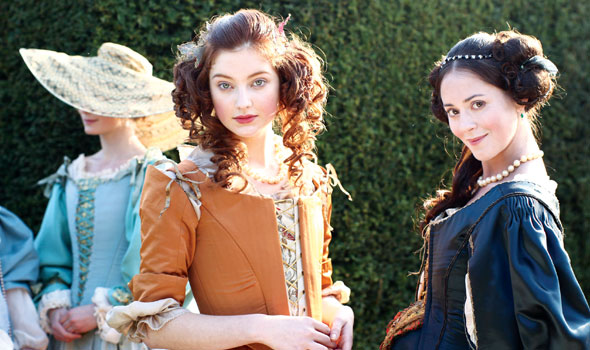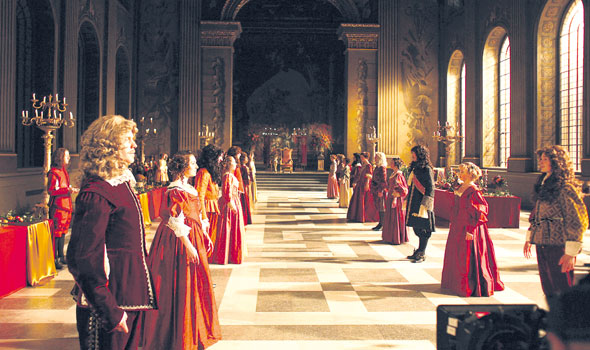What the blazes!
The Great Fire of London, following hard on the heels of the Great Plague, were to be two defining tragedies of the reign of King Charles II . Now, for the first time, the story is being brought to the small screen in a four-part ITV series starring Andrew Buchan as baker Thomas Farriner, Daniel Mays as Samuel Pepys and Charles Dance as Lord Denton, the King’s ruthless intelligence officer.
It is written by Tom Bradby, novelist and ITN political editor. ‘It didn’t take me long to spot the many contemporary resonances,’ he says. ‘There are the two Royal brothers, the Protestant Charles [Jack Huston] and his Papist brother, James, Duke of York [Oliver Jackson-Cohen], bound together by the childhood tragedy of the beheading of their father, Charles I.
‘Then there’s the parlous state of government coffers, disillusionment with a foreign war and intense fear of a religious minority perceived by some as being hell-bent on undermining society and the state.’
 Ladies of the royal court: Lady Castlemaine (Susannah Fielding) and Frances Stewart (Antonia Clarke)
Ladies of the royal court: Lady Castlemaine (Susannah Fielding) and Frances Stewart (Antonia Clarke)The modern-day echoes are not hard to pinpoint.
But, in the end, says Bradby, the success or otherwise of this undertaking is whether it works as drama. ‘I asked myself many times whether it was really a thriller, a disaster movie or something rooted in relationships and concluded that it would only work if it were all three in equal measure.’
Judging from the first episode, which was broadcast on ITV 1 last Thursday, I’d say he’d succeeded. The initial focal point is baker Tom, a widower and father to two young daughters, who keeps an increasingly proprietorial eye over his sister-in-law Sarah [Rose Leslie], whose husband has not returned from war.
‘Tom made loaves, pies and pastries,’ says Andrew Buchan, star of Broadchurch, ‘and also baked what was known as ship’s biscuit, the biscuit supplied to the Royal Navy. Because of it, he became known as the King’s baker.’
Andrew wanted to be involved in The Great Fire from the moment he read the script. ‘My first reaction was that I knew very little about the subject and that I should have known a lot more since it was such an important event in our history. And, the more I read, the more I realised that this was a horrifying story.’
One part of the drama sees Tom struggling to help inmates escape from Newgate Prison as the inferno rages. ‘It was probably three of the hardest days’ filming I’ve ever done. Newgate was destroyed in the original fire so we filmed those scenes in dungeons in Clerkenwell.
 Daniel Mays as Samuel Pepys
Daniel Mays as Samuel Pepys‘They’re like huge vaults which were pumped full of dense smoke. It was insanely hot, your vision was limited and you couldn’t breathe. It was really gruelling.’
All of this could have been avoided, of course, by the use of computergenerated imagery (CGI). But the producers were keen to employ pyrotechnics and special effects. Says executive producer Douglas Rae: ‘We made the decision to work with real fire although specialist firefighters and medics were on set throughout filming.’
The main fire sets were built just outside Henley. ‘We had a big control panel like a spaceship so we could choose exactly where would go up in flames and when.
‘Then, right at the end of filming, we burnt the whole set down with several cameras running at once and lots of fingers firmly crossed.’ He laughs, ‘You spend a lot of money on a set and then you burn it down!’
The entire production is said to have cost $10m.

Daniel Mays, who played opposite Sheridan Smith in Mrs Biggs, was pleased with the grittier interpretation of Pepys. ‘In previous dramas, he’s been played quite tongue-in-cheek, a bit bawdy. But, as Clerk of the Acts to the Navy Board and later an MP and Chief Secretary to the Admiralty, he was a man of some standing.’
Daniel’s son, Mylo, helped his father with some of his research on the famous diarist. ‘He’d studied the subject at school and came to Dorney Court, near Windsor, which doubles as Pepys’s London home. I’d also read Claire Tomalin’s biography of Pepys, The Unequalled Self, which was a fantastic place to start.’
In the end, though, there’s no substitute for the great man’s diaries, accounts spread over 10 years. ‘When it became too much material to get through in the time allotted, I downloaded Kenneth Branagh reading them on audiotape. It meant I had Ken rolling around my head throughout filming.’
For Charles Dance, there was much pleasure to be had in playing a baddie. ‘Denton believes absolutely in what he’s doing. In his mind, it’s highly likely there’s a Catholic plot against the King and he’s determined it won’t succeed.’
 The lords and ladies of the court of King Charles II
The lords and ladies of the court of King Charles IILord Denton is a fictional character although based on real people at the time. ‘He’s effectively head of security for Charles II, the modern equivalent, I suppose, of the boss of MI5, and there was a real need for him. Denton worked for Charles I before he’d had his head chopped off on the orders of Oliver Cromwell and he’s never lost his loyalty to the monarchy.’
Each of the four days of the fire is charted in the four episodes. And despite the drama at the core of the piece, there were nonetheless moments of levity. For one scene, it was necessary to film on what looked like the royal barge. Says Douglas Rae: ‘We acquired it from the Queen’s Jubilee, dressed it up a bit and put it on the Olympic rowing lake.’
Charles is persuaded for his own safety that he should leave Whitehall, not by land but via the relative calm of the Thames. ‘It’s not until he gets to a reconstruction of London Bridge burning down that he fully comprehends the seriousness of the situation. ‘We see him chatting on board to his courtiers as the camera pans out. It was only then that we realised the camera crew on board were too heavy for the barge, which was slowly beginning to sink.’
It gives a whole new meaning to going through fire and water.
The Great Fire continues on ITV1 on Thursdays at 9pm.



